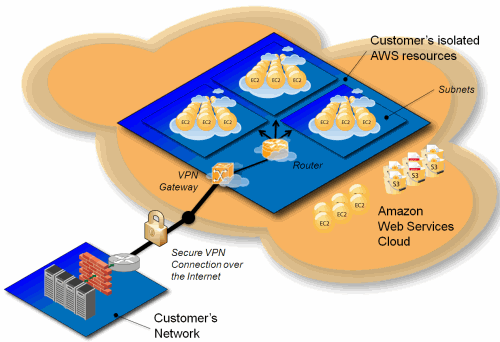What is a Private Cloud?
A private cloud is a cloud computing environment dedicated to a single organization. Any cloud infrastructure has underlying compute resources like CPU and storage that you provision on demand through a self-service portal. In a private cloud, all resources are isolated and in the control of one organization. So, the private cloud is also called the internal or corporate cloud.
What is the difference between a private cloud, a public cloud, and a hybrid cloud?
Cloud computing is the on-demand delivery of IT resources over a network. However, resource ownership and management responsibilities can belong to different parties due to differences in how the cloud environment is set up and managed. We explain the two other common cloud deployment methods below.
Public cloud
A third-party cloud service provider manages the underlying computing resources. The provider is responsible for resource maintenance and guarantees availability, reliability, and security through service-level agreements. You don’t buy, own, and maintain physical data centers and servers; instead, you access technology services on an as-needed basis. In addition, several tasks, such as runtime resource scaling, are automated for operational efficiency.
Private cloud compared to public cloud
It is almost impossible to replicate public cloud infrastructure privately. You get significantly more breadth and depth of services from a public cloud provider because it is fully dedicated to scaling and improving its offerings. You also get more innovation, access to a global community, and proven operational expertise.
Hybrid cloud
A hybrid cloud is an IT infrastructure design that seamlessly integrates a company's public and private clouds. As a result, you can store your data and run your applications across multiple environments without noticing a difference. Your hybrid cloud environment consolidates your infrastructure, so that you can provision, scale, and centrally manage all your compute resources.
Private cloud compared to hybrid cloud
Hybrid cloud services extend your private cloud computing model into the public cloud. For example, your private cloud applications can access public cloud resources when there is a spike in traffic that your data center cannot handle. You can also use hybrid cloud computing services to transition smoothly from private cloud environments to public clouds.
How did the term private cloud originate?
Before Amazon introduced cloud services, most companies purchased and maintained hardware like servers, storage devices, and networking devices. They kept this hardware in their internal on-premises data centers and co-location facilities to support their IT operations. After we launched Amazon Web Services (AWS), companies attempted to replicate the cloud computing model on their internal infrastructure. The term private cloud was introduced to distinguish between these internal cloud environments and third-party, public cloud services provided by organizations like us.
Today, some companies have adopted technologies and changes in their operations to offer some of the concepts of cloud computing. One example is that companies can charge their business units for the computing resources that they use. However, for the most part, customers have not truly succeeded in deploying a private cloud with benefits comparable to the public cloud.
What are the benefits of a private cloud?
Some organizations believe that a private cloud gives them benefits like enhanced security, flexibility, and control. They prefer the freedom to make their own architectural decisions and choose the hardware and software best suited for their requirements. Some believe they require a private cloud to meet regulatory compliance requirements for their sensitive data.
However, it is important to note that any benefits a private cloud infrastructure offers are limited to its implementation method. Public clouds offer far greater security, flexibility, and cost benefits than any private cloud solution. For example, AWS is architected to be the most flexible and secure cloud computing environment available today. Our core infrastructure is built to satisfy the security requirements of the military, global banks, and other high-sensitivity organizations. It is backed by a deep set of cloud security tools, with 230 security, compliance, and governance services and features.
How does a private cloud work?
Private cloud architecture is similar to the public cloud and requires the implementation of similar technologies.
Virtualization
Virtualization is the technology that abstracts IT resources from their underlying physical hardware. Users can create virtual machines or software units and interact with them in the same way as physical machines. Virtualization software pools together hardware resources like CPU, memory, or storage and allocates them to the virtual machines on demand.
Management software
Administrators require management software to control and manage their IT infrastructure centrally as software units. They use this software to implement consistent configurations across servers and application environments, ensure security compliance, and optimize resource allocation.
Automation technologies
Automation speeds up tasks like integrations and server provisioning that are tedious and error-prone when performed manually. Organizations looking to implement a private cloud environment must provide automation capabilities to make cloud infrastructure management more efficient.
In addition to private cloud technologies, organizations also have to implement changes to their development and deployment practices. For example, cloud-centered application practices like DevOps and DevSecOps and architectures like microservices and containers bring greater efficiency and flexibility to the private cloud environment.

What are the types of private cloud solutions?
There are four main types of private cloud infrastructure.
On-premises private cloud
An on-premises private cloud is one that you can deploy on your own resources in an internal data center. You must purchase the resources, maintain and upgrade them, and ensure security. On-premises private cloud management is expensive and requires heavy initial investment and ongoing expenses.
Managed private cloud
A managed private cloud is a single-tenant environment fully managed by a third party. For example, the IT infrastructure for your organization could be purchased and maintained by a third-party organization in its data center. The third party provides maintenance, upgrades, support, and remote management of your private cloud resources. While managed private clouds are expensive, they are more convenient than on-premises solutions.
Virtual private cloud
A virtual private cloud is a private cloud that you can deploy within a public cloud infrastructure. It is a secure, isolated environment where private cloud users can run code, host websites, store data, and perform other tasks that require a traditional data center. Virtual private clouds efficiently give you the convenience and scalability of public cloud computing resources along with additional control and security.
How can AWS support your private cloud computing requirements?
AWS is the world's most comprehensive and broadly adopted cloud platform, offering more than 200 fully featured services from data centers globally. Millions of customers—including the fastest-growing startups, largest enterprises, and leading government agencies—are using AWS to lower costs, become more agile, and innovate faster. You can run virtually any type of workload in the AWS Cloud. However, if you require greater control and isolation, you can run a virtual private cloud using Amazon Virtual Private Cloud (Amazon VPC).
What is Amazon VPC?
Amazon VPC is a service that lets you launch AWS resources in a logically isolated virtual network that you define. You have complete control over your virtual networking environment, and you can, for example, select your own IP address range and create subnets.
Here are some things you can do with Amazon VPC:
- Secure and monitor connections, screen traffic, and restrict instance access inside your virtual network
- Spend less time on setup, management, and validation of your virtual network
- Build and manage a compatible virtual private cloud (VPC) network across your AWS services and on premises
Get started with cloud computing on AWS by creating a free account today.






